The Netherlands Gaming Authority, Kansspelautoriteit announced that four out of ten games containing loot boxes they studied infringe upon the Dutch laws put in place by the aptly named Betting and Gaming act. The reason for this was that in the four games that violated this act the prizes found in the boxes had a real market value because they could be traded outside of the game. This creates an avenue for an interesting conversation about the controversial purchasable rewards. Generally disliked by gamers and touted as completely optional by publishers, loot boxes have consistently had questions of their legality brought up against them recently.
According to a press release the study they carried out consisted of analyzing and determining the legality of loot boxes as a whole. The Guide of Assessing Games of Chance was reportedly used in the evaluation of the matter as well, which was also utilized to previously assess the country’s gaming market. Ten games were selected “…based off of their popularity on a leading Internet platform that streams videos of game and players.” We can safely assume that this unnamed platform is indeed Twitch, but of course, the Gaming Authority was not able to name specifics most likely due to legal reasons. The press release also details the fact that addiction analysis was also brought into play, but it seems the Gaming Authority were thorough in their studies, consulting addiction care specialists on the matter. It’s worth noting that this study was not directed at the potential addiction of video games, which is a whole different beast to discuss and study, and instead focused on the loot box systems found in the aforementioned ten games.
“Six of the ten loot boxes that were studied do not contravene the law,” the report states in its call for reform. They call on the creators of the four games that violated the Betting and Gaming act to change their games accordingly in order to get rid of the elements they determined as addictive. However, they seem to be most concerned with the targeting of children, or more that there are no measures put in place to prevent addiction in what they call “vulnerable groups.” The Gaming Authority gave the creators of the games until June 2oth to alter their games in a manner that coincides with Dutch law.
You can find the report on the Netherlands Gaming Authority’s official website, and download the English version here. This is a captivating new chapter in what we can only assume is a conversation that will continue for many years to come. Until then June 20th awaits, then the world will hopefully have a decisive answer on this specific issue regarding loot boxes in the Netherlands.



